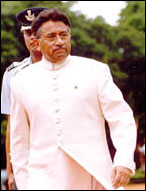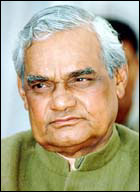 Home > Cricket > Diary archives
Home > Cricket > Diary archivesSeptember 5, 2001
Tit for tat
Prem PanickerAn entire rain forest has been decimated to produce the paper on which, over the last month, the government's decision not to permit the Indian team to play cricket against Pakistan as part of the Asian Test Championship has been analysed, post-mortem-ed, discussed, debated...
Uma Bharti claims national interest. Dr A C Muthiah believes that Asian Cricket Conference chief Jagmohan Dalmiya's intemperate threats angered the government and forced it to cancel. BCCI vice-president Kamal Morarka thinks Muthiah is full of it.
Assorted columnists believe that the government got it right, assorted others that the government got it wrong, a few ask why cricket is being victimised while other sporting contacts are permitted and, answering their own question, figure that perhaps the government by targetting cricket is merely angling for cheap publicity.
The funny thing is, though time and again it has been mentioned in the media that the decision was taken by Prime Minister Vajpayee in consultation with External Affairs Minister Jaswant Singh and Home Minister L K Advani, we have all been content with quoting Uma Bharti, instead of asking the big three for answers.
The latest refusal, in fact, has its genesis in the Agra Summit, earlier this year, that saw Vajpayee and Pakistan President General Pervez Musharraf get together for talks supposedly aimed at solving the Kashmir issue.
 Those who followed those talks will be aware that Musharraf insisted on a one-point agenda -- to wit, Kashmir -- and maintained that until that was resolved, there would be no point to discussing anything else at all.
Those who followed those talks will be aware that Musharraf insisted on a one-point agenda -- to wit, Kashmir -- and maintained that until that was resolved, there would be no point to discussing anything else at all.
Politics-watchers will be equally aware that India, for its part, said that Kashmir should be just one point -- not the only item -- on the agenda, that issues such as cross-border terrorism should be taken up as well.
It is here, as is now well known, that the talks failed -- because neither side would budge from its stance.
What is not as well known, though, is that at the very first meeting between the two leaders, Musharraf urged Vajpayee with all the eloquence at his disposal to permit cricket ties between the two nations to be renewed.
The subject came up again at a subsequent meeting.
And more than anything else, it is this that has prompted the government to turn thumbs down on the ATC.
The government had, during the Summit, suggested a series of Confidence Building Measures, aimed at improving ties between the two countries. Some of these were: a reduction of troops on both sides of the border; an agreement for mutual exchange programmes between Indian and Pakistani universities so that young people can spend time on the opposite side of the fence, get to know the other side and in so doing, learn to shed their prejudices; planned monthly meetings between senior diplomats of both sides who would form a joint group to solve immediate problems; multiple entry points at the border so anyone from either side desirous of visiting the other country can do so with a minimum of fuss, and so on.
No way, said Musharraf. Publicly, mind you. "There is no point in having confidence building measures, when Kashmir is not resolved there can be no confidence."
So today, the Indian government in its turn is asking, if exchanging students between the two countries will not better relations; if allowing people of both countries to cross the border sans fuss won't better relations; if reducing troops along the border won't dispel distrust and improve bilateral relations; if the other measures proposed will not build trust and goodwill, will not strengthen relations between the two countries, then how will playing one single cricket match do it?
The government, too, is miffed over the fact that when it requested Pakistan to alter the dates of the Champions' Trophy in order that it does not clash with the hockey event of the upcoming Afro-Asian Games, the Pakistan government refused.
At another level, it will be recalled that a few months ago, the government was forced to upgrade security for players of the order of Sachin Tendulkar and Sourav Ganguly, following threats by the Lashkar-e-Tayeba and other outfits that Indian stars were their targets for kidnap, or worse.
When the subject of terrorism was brought up, however, Musharraf -- again publicly -- refused to acknowledge that there was any such thing. What there was, he said, is a freedom struggle, and the various outfits were merely participants in that struggle.
This in turn led the government to reason thus: the LeT is based in Pakistan, and it, along with its fellows, has been accorded legitimacy by Musharraf's words. Against that background, and in context of the warnings by the Intelligence Bureau and the RAW, how is it possible to ignore the danger of sending players into a country where the 'freedom fighters', who have openly threatened their wellbeing, operate unfettered?
These are the factors the government considered. The three senior leaders reasoned that when Pakistan insists on cricket while shooting down all other proposals for the betterment of ties, there was grounds to argue that the real focus was not improving relations. That cricket was vital only because of the financial rewards to be obtained by staging India-Pakistan encounters.
 And so, Messers Vajpayee, Singh and Advani turned their thumbs down.
And so, Messers Vajpayee, Singh and Advani turned their thumbs down.
At the time of writing this, the government's line is that Vajpayee and Musharraf are due to meet again, later this month in New York. At that point, if Pakistan shows signs of agreeing to a series of confidence building measures, then the Indian government will throw in cricket ties as part of the package.
And if not, not.
To my mind, there is only one area in which the government has erred, and continues to err -- and that is in merely announcing decisions, without ever bothering to spell out its reasons, without troubling to take the public into its confidence.
Had the three ministers, or their spokesperson, bothered to set out the arguments (which, incidentally, my colleague in New Delhi, Josy Joseph, got by the simple expedient of making two phone calls to two ministries) there would have been a debate. And a consensus, one way or the other.
As it turns out, though, there is only the bare, shorn-of-explanations, take-it-and-like-it denial of permission by the government. And heartburn among the public.
Which seems a pity.
Yesterday's diary: Tour Troubles -- Faisal Shariff
The Rediff Email Diary -- the complete archives
![]()
![]()
Email : Prem Panicker
©1996 to 2001 rediff.com India Limited. All Rights Reserved.